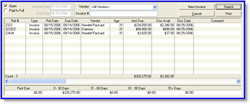Entering Invoices
New invoices are easily created for both new and existing vendors. Using sophisticated search algorithms, the tool populates new invoices with all existing vendor information. This information can be easily updated, and the changes are reflected through the rest of the system.
Invoices created within the system are categorized as one of the following: (1) an inventory purchase, or (2) a miscellaneous purchase. Inventory purchases are reconciled with receivings and the expense distribution is created based on the general ledger account for inventory. Miscellaneous purchases are entered with the appropriate general ledger expense accounts to define the distribution for the invoice. If the vendor has a pre-defined general ledger account, then it becomes the default account for the invoice, reducing time manual data entry.
Paying Invoices
Payment of invoices within the system may broken into batches or check runs. Invoices may be manually marked to create a batch, or automatically selected according to pre-defined criteria such as by discount or by due date. Vendor credits may be manually applied on a case-by-case basis, or automatically applied to any outstanding invoice. As a second step, checks may be printed for the selected payments within the batch.
Bank Statement Reconciliation
The bank reconciliation area of the tool automates the bank statement reconciliation process. Deposits generated from the point of sale or the accounts receivable payment are separated into deposit groups such as cash and check, credit cards, and finance transactions. Checks are reconciled on a check-by-check basis and bank fees are charged to the appropriate accounts.


